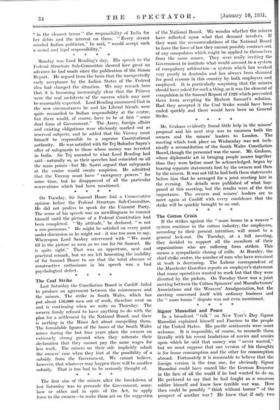advance he had made since the publication of the Simon
Report. He argued from the basis that the unexpectedly early acceptance by the Indian States of the Federal idea had changed the situation. We may remark here that it is becoming increasingly clear that the Princes were the real architects of the success which may now be reasonably expected. Lord Reading announced that in the new circumstances he and his Liberal friends were quite reconciled to Indian responsibility at the centre, but there would, of course, have to be at first " some dual form of Government." The Army, foreign affairs and existing obligations were obviously marked out as reserved subjects, and he added that the Viceroy must himself be responsible to a superior Constitutional authority. He was satisfied with Sir Tej Bahadur Sapru's offer of safeguards to those whose money was invested in India. Sir Tej assented to what Lord Reading had said—naturally so, as their speeches had coincided on all the main points—but Mr. Sastri argued that safeguards at the centre would create suspicion. He admitted that the Viceroy must have " emergency powers " for some time, but he disapproved of all the particular reservations which had been mentioned.
• * *


































 Previous page
Previous page